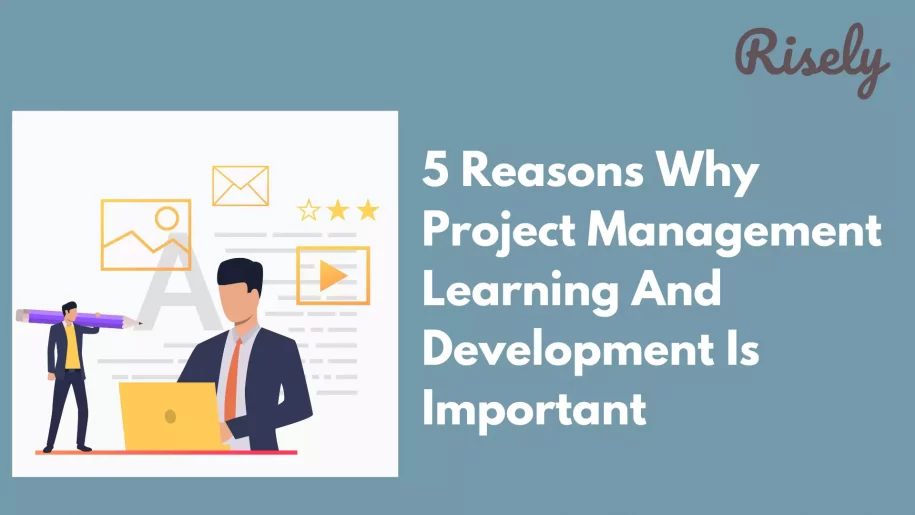5 Reasons Why Project Management Learning And Development Is Important
Are you a manager looking to enhance your project management skills? Are you seeking ways to navigate the complexities of project execution and deliver successful outcomes? Look no further! In this blog, we dive into project management learning and development. As a manager, you understand the importance of continuous improvement and staying ahead of industry trends. We will explore the essential skills needed to be a successful project manager, the significance of learning and development programs, and the role of a learning and development project manager. Let’s dive in!Role of a Project Manager
A project manager plays a crucial role in ensuring the successful completion of projects within the specified constraints of time, budget, and quality. They are responsible for planning, executing, monitoring, controlling, and closing projects. Primary responsibilities of a project manager;- Defining project objectives, scope, and deliverables.
- Developing a comprehensive project plan and schedule.
- Allocating resources effectively to execute the project tasks.
- Managing project risks and issues and implementing mitigation strategies.
- Monitoring project progress and ensuring adherence to timelines.
- Facilitating effective communication among team members and stakeholders.
- Making critical decisions and problem-solving to overcome project challenges.
- Ensuring the project meets quality standards and customer expectations.
- Conducting project reviews and lessons learned sessions for continuous improvement.
- Coordinating project closure activities, including finalizing documentation and conducting post-project evaluations.
Understanding the Importance of Project Management Learning and Development
Project Management Learning and Development are essential for project managers to stay relevant, enhance their skills, and adapt to the evolving project management landscape. Continuous Improvement Project management is a dynamic field that constantly evolves with new methodologies, tools, and best practices. By engaging in learning and development initiatives, project managers can stay up-to-date with industry trends, emerging technologies, and innovative project management approaches. This allows them to continuously improve their knowledge and skills, ensuring they can tackle new challenges and deliver successful projects. Enhancing Project Management Skills Learning and development programs allow project managers to enhance their project management skills. These programs often focus on specific areas such as stakeholder management, risk assessment, mitigation, budgeting, and communication. By honing these skills, project managers can improve their performance, increase project success rates, and effectively navigate complex project environments. Adapting to Changing Methodologies The project management landscape is shifting towards more agile and collaborative approaches. Learning and development initiatives help project managers understand and embrace these methodologies, such as Agile, Scrum, or Lean. By acquiring the necessary knowledge and skills, project managers can adapt their management practices to deliver projects more efficiently, respond to changes quickly, and foster collaboration within their teams. Gaining a Competitive Edge In today’s competitive job market, project managers must differentiate themselves. Learning and development programs offer opportunities to acquire new certifications, such as the Project Management Professional (PMP) certification or industry-specific credentials. These certifications demonstrate a project manager’s expertise and commitment to professional growth, making them more marketable and desirable to employers. Networking and Knowledge Sharing Learning and development initiatives provide project managers with networking opportunities and knowledge-sharing platforms. Participating in workshops, conferences, and online communities allows project managers to connect with peers, share experiences, exchange best practices, and gain insights into industry trends. These interactions can broaden perspectives, spark innovation, and foster a sense of community among project management professionals. By embracing project management learning and development, project managers can enhance their capabilities, drive project success, and position themselves as effective leaders. It is a continuous journey of growth and improvement that ultimately benefits the individual project manager and the organizations they serve.
Essential Project Management Skills
Project management skills are critical for successfully planning, executing, and delivering projects within the defined scope, timeline, and budget. Here are key project management skills that project managers should develop: Planning and Organizing:- Defining project objectives, scope, and deliverables.
- Developing a comprehensive project plan, including tasks, milestones, and timelines.
- Creating work breakdown structures (WBS) to break down project activities.
- Organizing and scheduling resources effectively to meet project requirements.
- Conducting risk assessments and developing risk management strategies.
- Leading project teams, motivating members, and fostering a collaborative work environment.
- Effective communication with stakeholders, team members, and clients.
- Active listening and understanding stakeholder needs and expectations.
- Facilitating meetings, resolving conflicts, and managing diverse team dynamics.
- Providing clear direction and guidance to team members.
- Developing realistic project schedules and managing deadlines.
- Allocating resources efficiently, considering availability, skills, and workload.
- Monitoring and tracking project progress against timelines and milestones.
- Managing project risks, anticipating potential issues, and implementing mitigation strategies.
- Identifying and addressing resource constraints and bottlenecks.
- Identifying potential risks and uncertainties that may impact project success.
- Assessing the likelihood and impact of risks and prioritizing them.
- Developing risk response strategies, such as avoidance, mitigation, transfer, or acceptance.
- Monitoring and tracking risks throughout the project lifecycle.
- Implementing contingency plans to address unforeseen risks.
- Developing project budgets, estimating costs, and tracking expenses.
- Monitoring project financials and ensuring adherence to budget constraints.
- Controlling project costs and identifying cost-saving opportunities.
- Managing procurement processes and vendor relationships.
- Evaluating the financial impact of project decisions.
- Establishing quality standards and metrics for project deliverables.
- Implementing quality control measures to ensure adherence to standards.
- Conducting regular quality reviews and audits.
- Managing customer expectations and delivering high-quality outputs.
- Continuously improving processes based on lessons learned.
- Analyzing complex problems, identifying root causes, and developing solutions.
- Making informed decisions based on available information and project constraints.
- Evaluating alternatives and assessing potential risks and benefits.
- Balancing competing priorities and making timely decisions.
- Embracing change and managing project uncertainties.
- Adapting project plans and strategies to accommodate unforeseen circumstances.
- Demonstrating flexibility in responding to shifting priorities or requirements.
- Continuously learning and adapting project management practices to new methodologies and technologies.
Conclusion
Project management learning and development are vital for managers seeking to excel in their roles. By continuously improving their skills and staying abreast of industry trends, project managers can enhance their leadership abilities, adapt to evolving methodologies, and deliver successful projects. The essential skills for project managers encompass technical expertise, leadership, communication, time and resource management, problem-solving, and adaptability. Engaging in learning programs, obtaining certifications, and networking with peers contribute to their professional growth. By investing in project management learning and development, managers can boost their effectiveness, drive project success, and elevate their careers in project management’s dynamic and competitive field. Sign up for Risely to learn about management development and evolve as an effective manager.Focus on active listening to spot gender inequality and bias in your team.
Take the free active listening skill assessment to identify weak areas and get support.
FAQs
What is project management in learning and development?
Project management in learning and development involves the application of project management principles, techniques, and tools to effectively plan, execute, monitor, and control learning initiatives. It ensures the successful delivery of training programs within defined scope, time, and budget constraints.
What are the 5 stages of project management?
The five stages of project management are initiation (project conception and definition), planning (developing a roadmap and resources), execution (implementation and task completion), monitoring (tracking progress and performance), and closure (project completion and evaluation).
What are the 4 types of project management?
The four project management approaches are traditional (waterfall), agile, lean, and hybrid. Traditional follows a sequential approach, agile emphasizes flexibility and adaptability, lean focuses on efficiency, and hybrid combines elements of different approaches based on project needs.
Other Related Blogs
How to Create a Course with AI: A Guide for L&D Professionals
How to Create a Course with AI: A Guide for L&D Professionals According to a McKinsey survey(1), only 11% of business leaders believe their leadership development initiatives yield meaningful results.…
How to build a Learning and Development Action Plan ft Katie Greenwood
How to build a Learning and Development Action Plan ft Katie Greenwood Does your company’s Learning and Development (L&D) strategy feel like more “guessing” than “winning”? You’re not the only…
Generative AI for Learning and Development: Getting Started
Generative AI for Learning and Development: Getting Started In 2024, organizations spent $401 billion globally on corporate training(1), yet 70% of employees report feeling unprepared for the future of work…
Future proofing a learning strategy for organizations with Inna Horvath
Future Proofing a Learning Strategy for Organizations with Inna Horvath With the advent of AI, everyone’s anticipating changes. L&D leaders in charge of building a learning strategy for organizations are…


